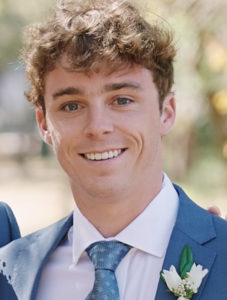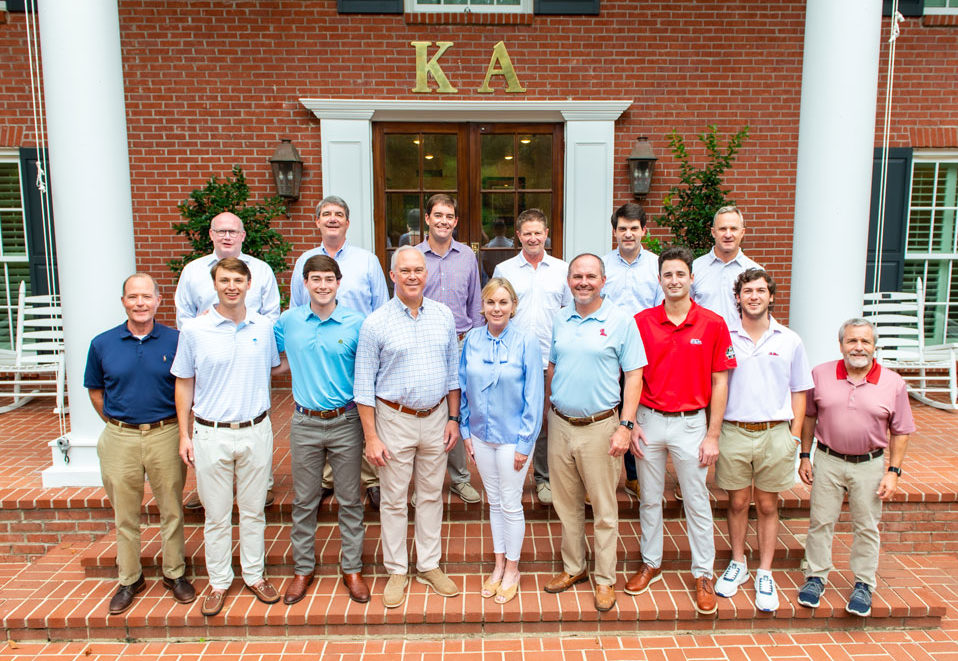Thomas Hayes Mayo, a 21-year-old University of Mississippi student, loved his friends and college life. Described as “a great friend that lit up every room he entered” by fellow students, he died April 14, 2022, from fentanyl poisoning.
“Thomas always wore a smile and appeared full of endless joy,” said his dad, Cal Mayo of Oxford, Mississippi. “He never saw a half-empty glass. He never met a stranger. He brought laughter and smiles to every group. Thomas was intelligent and took pride in his grades and academic accomplishments.”
Now the Thomas Hayes Mayo Lab Fund is building momentum toward paying tribute to Mayo’s life by helping those battling substance misuse and mental health issues, including depression and anxiety. Becoming part of the William Magee Institute for Student Wellbeing, the Mayo Lab has a funding goal of $500,000 of which over $300,000 has been secured.

The endowment memorializes the Ole Miss junior who was the youngest of Caroline and Cal Mayo’s four children. Contributions to the fund include a $100,000 anonymous commitment, almost $78,000 in memorial gifts, and significant gifts from his parents, Sigma Chi fraternity, Kappa Alpha fraternity and others.
“The number of memorials in support of the Magee Institute in memory of Thomas overwhelmed us,” said Caroline Mayo. “The Magee Institute and the UM Foundation isolated the donations to use in some special manner, and after considering several ideas, we decided to use the memorials to support the Thomas Hayes Mayo Lab.
“Thomas cared deeply about people, and he would want his legacy attached to a cause that helps other people navigate the difficulties life sometimes presents,” she said.
Cal Mayo said, “Our dream is for the fund to provide continuous financial support for the Thomas Hayes Mayo Lab, which will serve as the engine generating educational information and structures to assist students of all ages — elementary school through graduate school — and communities to understand and address the various mental health problems that impact all of us.”
Meagen Rosenthal, interim director of the William Magee Institute for Student Wellbeing, said there is a great need for solutions.
“As the mental health and substance misuse epidemic deepens amongst our students, families and communities, we must find new ways of meaningfully engaging students to help them find their joy and use best practices that already exist for improving wellbeing,” she said. “My vision for the Thomas Hayes Mayo Lab is for it to be a space where we will work directly with students to understand their needs and deliver evidence-based content using compelling storytelling, peer-to-peer discussions and premium contemporary media, such as podcasts and newsletters, that can readily be integrated into their daily lives.”
David Magee, operations manager for the Magee Institute, shared how the Mayo Lab will strengthen the university’s efforts.
“The Thomas Hayes Mayo Lab is a dream come true for us with respect to the work we’re embarking upon in the William Magee Institute for Student Wellbeing and the institute’s Jackie and Faser Triplett Research Center because it provides a structure for educating students and parents about solutions in mental health and substance misuse,” Magee said. “I’ve been blessed to speak to more than 5,000 high school students and 1,000 parents in the past year and many have asked for help in tackling these critical issues.
“We’ve got to get upstream. Student mental health and substance misuse issues typically begin in middle school or high school, not college — yet things have changed so rapidly. With the arrival of fentanyl, educators and parents need help. The Thomas Hayes Mayo Lab places our focus directly on providing solutions through education, research and communication.
“We aim to meet students where they are, developing peer-to-peer education, while delivering the latest insights to parents and educators,” he said.
The initial launch of the Mayo Lab includes two foundational projects that have the potential to impact many individuals and families.
“We don’t want to waste any time, because the crisis is now, and it impacts most every family in this region and country in some way,” Magee said. “One project develops The Happiness Team of Ole Miss students as peer educators, because research shows peer-to-peer education is one of the most effective ways to reach students. They’ll get the opportunity to engage with students in schools throughout Mississippi, as well as on campus.”
That project begins this fall; the other significant launch is The Mayo Lab podcast with Magee as host.
“There’s a lot of good, useful research and information available for students and parents but I find much of it lives in silos, never reaching those who need it,” Magee said. “When I speak in schools and with parents, they’re begging for more. To that end, we’re developing The Mayo Lab podcast as a premium weekly program to bring together the most captivating, useful information and voices from throughout the country to educate and inform parents, educators and all stakeholders.
“We’ll begin assembling the team and recording episodes late this fall and launch The Mayo Lab podcast in early 2023. I can hardly wait, because I know this will quickly become a go-to source for solving this student mental health and substance misuse crisis,” he continued.
Rosenthal believes the Mayo Lab can become a model for the nation.
“Through the combination of our university’s strong track records in both engaging storytelling and research, it is my hope that the Thomas Hayes Mayo Lab becomes a model that can be replicated across our state and around the country,” she said. “The only way we can meaningfully begin to address the mental health and substance misuse epidemic in our country is by working together to share and spread the best information in ways that will allow our students, families and communities to readily use it every day.”
Thomas Mayo was a member of the Sigma Chi fraternity.
Edward Francis II of Baton Rouge, Louisiana, president of Sigma Chi, said that the chapter believes that the creation of the Mayo Lab at the Magee Institute will prove to be a valuable resource to all students, “especially those who feel hopeless in the grip of addiction.”
“We hope to see an increase in awareness around the Greek community about the dangers of substance misuse and abuse. A lack of education contributes to the problems we are seeing in college students today. It would also be extremely rewarding to see tangible results from the creation of this lab. Obviously, we want as many people as possible to receive help, but even one life saved is all we can hope for.
“Thomas’ impact and memories are discussed daily, particularly among his closest friends and members of his pledge class. The creation of this lab will undoubtedly prove to be a positive way to honor Thomas’ memory. We feel that helping others is exactly what he would have wanted,” Francis said.
Lee Baker Jr. of Augusta, Georgia, president of Kappa Alpha Order, said the fraternity was grateful to be a small part of the William Magee Institute’s mission to ensure Ole Miss students will “never feel hopeless by providing the necessary resources to combat their struggles.”
“Thomas had a genuine impact on everyone with whom he interacted, but especially with the Ole Miss community, including the vast majority of our chapter,” Baker said. “His personality broke down social barriers and he was a friend to many of us. Our hope, through this donation, is to honor Thomas’ legacy by providing support for students struggling with similar mental health issues.”
“While he had close friends across campus and outside of Oxford and Ole Miss, Thomas deeply appreciated his fraternity experience,” said Caroline Mayo. “Many of his happiest moments occurred with his brothers and took place at Ole Miss sporting events, in which Thomas participated passionately his whole life.”
Mayo also played intramural soccer and worked part time delivering for Oxford Floral, where he enjoyed his relationships with co-workers. The business major had not made a final decision about his future career but had considered taking the LSAT and attending law school.
The William Magee Institute for Student Wellbeing is named for David Magee’s son, an honors student who lettered in track and field for Ole Miss and graduated in 2012, dying a year later of an accidental drug overdose.
“Like so many in our community, I am honored to have known and loved Thomas,” said Magee. “We’ll always miss his passion for life, and I’ll never get over the loss of my son William and too many others. But the Thomas Hayes Mayo Lab will save many others, doing important work that nobody else in the country is doing.
“I know that’s what Thomas wants us to do. So, here we go.”
To make a gift to the Thomas Hayes Mayo Lab Fund, send a check with the fund’s name written in the memo line to the University of Mississippi Foundation, 406 University Ave., Oxford, MS 38655; or online at https://nowandever.olemiss.edu.
For more information, contact Brett Barefoot, senior director of development for Parent and Family Leadership, at bmbarefo@olemiss.edu or 662-915-2711.
By Tina H. Hahn/UM Development


